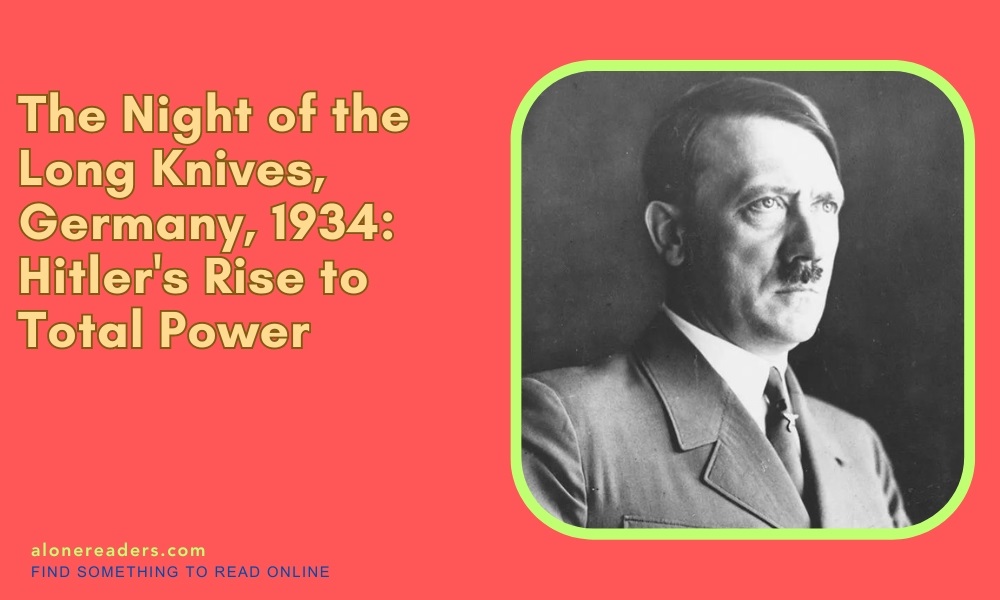
The Night of the Long Knives, which took place from June 30 to July 2, 1934, remains one of the most chilling and decisive events in the rise of Adolf Hitler to total power in Germany. This brutal purge marked a significant turning point in the Nazi consolidation of power, illustrating Hitler's willingness to use extreme violence to eliminate political opposition and enforce loyalty within his own ranks.
Prior to this event, Germany was in a state of turmoil. The Nazi Party, led by Hitler, had ascended to power in January 1933, promising to restore Germany's fortunes after its defeat in World War I and the hardships of the Great Depression. However, despite their electoral successes, the Nazis did not have absolute control. The SA (Sturmabteilung or Storm Troopers), a paramilitary organization under Ernst Röhm, had played a crucial role in Hitler's rise, but by 1934, Röhm's growing power and socialist rhetoric became a threat to Hitler’s authority and the traditional conservative military leaders of Germany.
Röhm had advocated for a "second revolution" that would entrench the socialist aspects of National Socialism, including stripping the traditional military of its power and merging it with the SA. This stance alarmed not only Hitler but also the Reichswehr (the German military) and the conservative elites, who feared their loss of control and the potential for a massive paramilitary force led by Röhm.
To consolidate power and reassure the military of his intentions, Hitler decided that Röhm and his followers needed to be eliminated. The purge was meticulously planned and executed with a mix of legal pretense and ruthless efficiency. On the night of June 30, 1934, Hitler, accompanied by loyal SS units, flew to Munich and other locations where they arrested Röhm and other SA leaders. Over the next two days, an estimated 150 to 200 people were executed without trial, including Röhm, who was killed in prison on July 1.
The purge was not limited to the SA. Hitler used this opportunity to target a variety of other political opponents, including Gregor Strasser, a former Nazi leader who had fallen out of favor, and Kurt von Schleicher, the last Chancellor of Germany before the Nazi consolidation of power, both of whom were murdered. These actions struck fear into the hearts of Hitler’s potential rivals and critics, demonstrating that no one was beyond his reach.
The Night of the Long Knives had far-reaching consequences for Germany. It effectively neutralized the SA as a political force, bringing the Reichswehr firmly behind Hitler and securing his absolute control over the Nazi party and the state. The military’s support was secured by their shared interest in eliminating Röhm and the SA leadership, who had threatened the traditional structure of military power in Germany.
Following the purge, Hitler’s power was further solidified when President Paul von Hindenburg passed away on August 2, 1934. The merging of the presidency with the chancellorship by Hitler marked the beginning of his undisputed rule as the Führer of Germany. This consolidation of power was largely unopposed, as the purge had effectively eliminated any serious threats to his leadership.
Internationally, the Night of the Long Knives sent shockwaves through European capitals, highlighting the brutal nature of Nazi governance and foreshadowing the totalitarian control that would lead to further atrocities, such as the Holocaust. It underscored the precariousness of political stability in Germany and signaled a dangerous path ahead, not only for Germans but for all of Europe.
The events of those days in 1934 are a stark reminder of how quickly power can be consolidated in a modern state and the lengths to which leaders will go to maintain and strengthen their hold on power. The Night of the Long Knives not only shaped the trajectory of Nazi Germany but also illustrated the catastrophic impacts of political purges on the fabric of society. As we reflect on this dark chapter, it serves as a cautionary tale about the dangers of unchecked power and the importance of safeguarding democratic values and institutions.